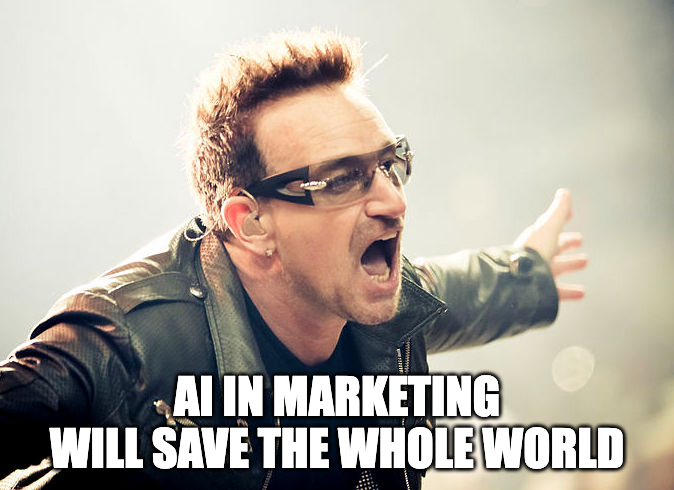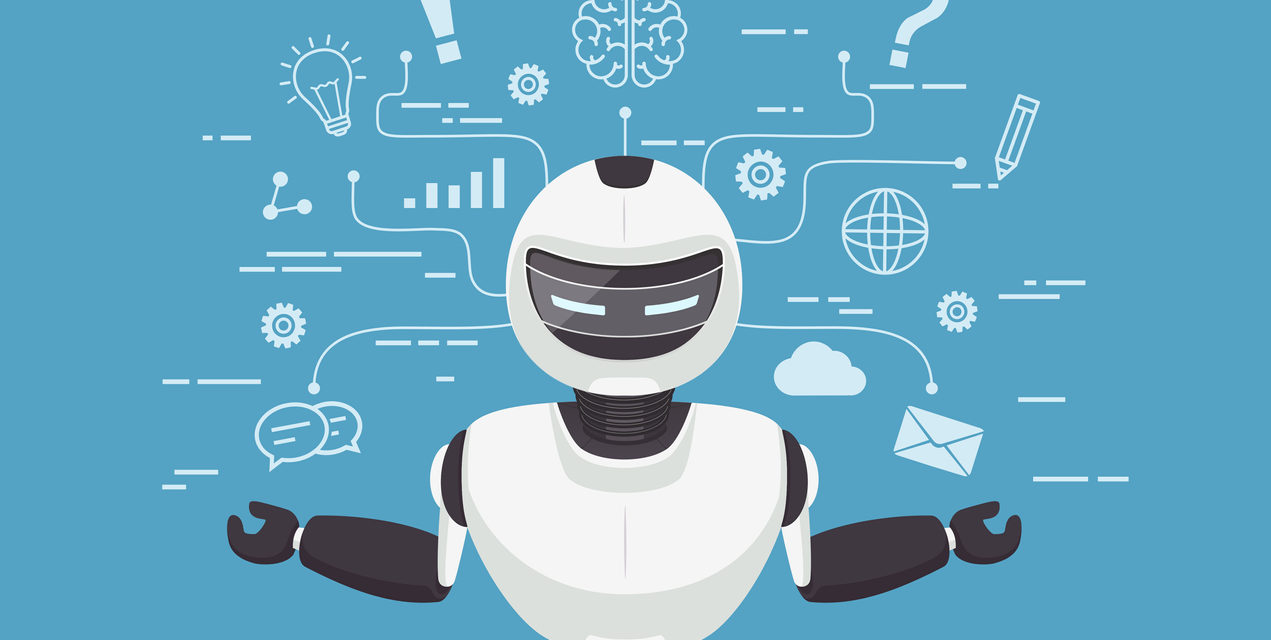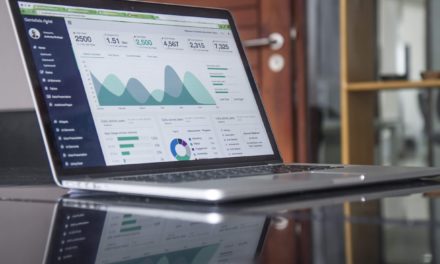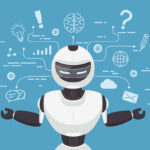Modern marketers need an in-depth understanding of their customers as individuals, not a smushed-together whole, as well as the agility and ability to act quickly and effectively to changes in the market and consumer sentiment. They need to be able to make real-time, data-driven decisions, but we all know this isn’t always possible when we’re knee-deep in new campaigns, intern wrangling and office gossip.
Many companies, therefore, are turning to marketing software powered by artificial intelligence (AI, derrr) to improve operational efficiency and customer satisfaction. These digital tools, of which there are now many, can ease the workload of us real, live humans while giving us a better understanding of our target audience. And what does this all lead to? Increased conversion rates, of course!
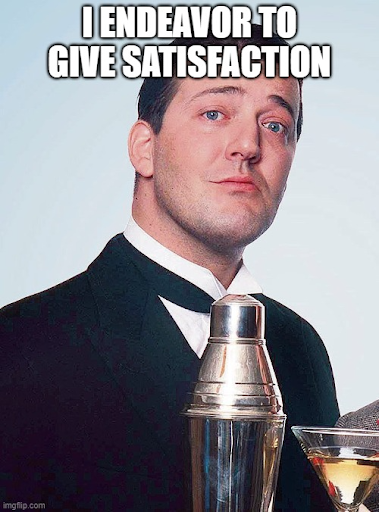
If you’re old enough to know PG Wodehouse’s Jeeves (for a start, well done on getting on the interwebz), you can think of AI in marketing as the man with the big brain. If you’re not old enough (or well-read enough) to get that reference, think of a highly intuitive butler. You’ve seen Downton Abbey, right?
AI in marketing basically figures out what we want, when we want it and how we want it, often before we even know it ourselves. The most obvious example in action today is the spooky way in which Google seems to present us with ads for things we want but we’re sure we’ve never said out loud or written down online.
Yep, that’s AI marketing at its most effective…and unnerving. But don’t worry, the machines have only just started to imitate human emotions, so we’ve got a good five years before they take over completely and start mating with our pets.
There’s a veritable digital buffet table of ways in which AI can be used to enhance marketing (more on that later), but first, we’re going to dig into how and why it makes A/B testing, arguably one of the most prickly of thorns in a marketer’s side, obsolete (hurray!).
Excuse me for teaching my grandma how to do a weird thing with eggs here, but A/B, or split testing, first trialed by Google in the year Pulp met up with its old school chums (2000), has been the standard way to optimize marketing campaigns for a while now.
Trialing two different versions of content, whether it be landing pages, email marketing or display ads, against two groups of people, A/B testing tools have long been the go-to way for marketers to increase eyeballs and conversion rates where copy and imagery can be adjusted. As a concept it makes sense, and in practice it provides some form of statistical significance, but like a monkey typing Shakespeare, it’s not very efficient. You need a whole lot of time and resources before anything meaningful comes out the other end.
Here’s where AI in marketing can change all that. Rather than comparing A against B, software driven by AI can also compare A against C, D, E, F and, in fact, provide test results for any combination of any letters of an infinite alphabet. Rather than just testing one variable at a time (and how often is that drilled into our marketing brains?), such as the size of a headline, it can test multiple variables at once, such as the size of a headline with this picture, that background color and that exact cartoon of a sausage dog waddling across the screen.
And, most importantly, rather than assuming all your customers are the same, as does the homogeneity fetishist that is A/B testing, AI can take factors such as customer status, habits and demographics into account, too. Cat ladies in Denver who like to shop online after midnight can be compared with ultimate frisbee bros from Detroit who still have their mom buy their undies, for example. Finally, AI testing can ensure every stage of your sales funnel, from email campaigns and social media ads to landing pages, calls to action, order forms and payment systems, are optimized to each individual user’s liking.
Getting that granular would require some serious cognitive gymnastics for any human, even Jeeves. For AI and machine learning algorithms, however, it’s all in a day’s — or second’s — work. By giving each unique customer exactly what they want, when they want it and how they want it, you can pimp your funnel into a supersonic sales slide of sophistication, resulting in better conversion rates and happy clients who are much more likely to advocate on your behalf.
How else is AI being used in marketing?
There are loads of other ways AI is helping today’s tech-savvy marketers knock whatever it is out of the park and into the world’s digital shopping basket. The benefits can be quantifiable, such as an increase in sales, or intangible, such as an uptick in positive consumer sentiment. AI tools can be employed at every stage of the sales journey, but let’s take a look at a few specific use cases and examples, just for shots and goggles.

Selecting the right message: If the marketers for Marmite know anything, it’s that people have different likes and dislikes. Your customers will respond to the same message differently; just like Spanx, marketing is not a one-size-fits-all kind of thing.
Some people respond to sentimental ads, others logic, others humor. Netflix is doing a really nice job with this. If the algorithm knows you’re a sucker for romcoms, it’ll present you with an image for, let’s say… The Holiday, that features Jude Law and Cameron Diaz. If it knows you like comedies, it’ll present you with an image of Jack Black and Kate Winslet. And presumably, if it knows you like good movies, it won’t snarl up your feed with The Holiday at all!
Granular personalization: AI can help marketers create unique experiences for each customer’s personal tastes based on their interests, past interactions, purchase history, location, demographics and more. Spotify is the boss at this, creating customized playlists for each user based on past listening habits, current hits across their preferred genres and similar music that people are talking about on the platform.
Chatbots: It seems everyone and their gran has a chatbot these days, and although sometimes we JUST WANT TO TALK TO A HUMAN, the natural language development processed through AI is getting better and better with every infuriating conversation we have with a robot. Salesforce uses its FAQ to provide a dataset for its chatbot, allowing it to answer more basic customer questions immediately. This frees up real customer service agents to spend their time on more complicated problems.
Predictive marketing: AI can release marketing teams from the drudgery of analytics by combining algorithms, datasets, models and machine learning techniques to create predictive analytics. These metrics join hands to create the fortune tellers of the digital world, helping us understand what products consumers will want to buy when, and therefore how to position campaigns. Amazon is doing this when it suggests products that we didn’t even know existed but now definitely can’t live without. Mailchimp’s Content Optimizer, which suggests how to improve the content, layout and imagery of email campaigns, is also using AI-powered predictive analytics to pre-empt user behavior.
The future of AI in marketing
In some ways, the future of marketing is already here. We already use technology to automate repetitive manual tasks and we’re already implementing AI to boost and segment our campaigns in the ways mentioned above, and more.
But let’s be honest. There are still plenty of problems with digital marketing: generic messages, mass email spamming and keyword-stuffed tedious blog content, to name but a few. Most marketers talk at people, not with people, and are failing to understand what makes their customers tick/open their wallets. So how will AI change the future of marketing going forwards?
It’s only going to get bigger: For a start, like that nasty rash you picked up in college, AI in marketing is here to stay and it’s only going to get more widespread. Gartner predicted that AI would replace 33% of data analytics in marketing in 2022, and its popularity is expected to grow year-on-year.
Marketing teams are under more pressure than ever to demonstrate ROI to stakeholders, and AI solutions will be essential tools to get them there, telling them where and how to allocate funds. AI is already providing those who use it with a distinct edge over the competition, an edge which is getting sharper and more slippery as society and the technology progresses. Essentially, if you don’t jump on the AI train, you’re likely to find yourself tied to the tracks, chest heaving, with no knife-wielding rescuer in sight.
Marketing will become more human: Yep, we get the irony of algorithms making marketing strategies more human, but that’s the weird and wonderful reality of the industry we work in. In today’s world of mobile phones, social media and real-time news, our audiences are always on, so our services must be on-demand also. Consumers want things now and they want things just for them. AI and machine learning will see the purpose of marketing tech switch from automation to personalization.
Anticipation and prediction will be the norm: Over time, AI will help marketers better predict what their customers will want in the future and allow them to make better personalized recommendations to increase conversions. Consumers may also start using AI to make decisions for them, such as when to book flights according to prices and their vacation allowance, what groceries to buy according to their weight loss goals and what work schedule to adhere to according to their personal productivity spikes.
AI will be all-encompassing: To achieve this, data science will need to work hand-in-hand with all facets of the user experience, from content format, to webpage and funnel design, to success measurement. Eventually, this should create an infinite loop where AI, which will no doubt be incorporated into all SaaS tools, engages customers and adds value the entire way along the customer journey.
AI will change the world: Okay, calm down, Bono. We know this sounds dramatic, but as AI changes the future of marketing, it really could make the world a better place. When used the right way, AI can promote sustainability, social accountability and tolerance on a global scale and have an impact on cities, governments and, most importantly, us lot. Like a precocious child who’s either going to do great things or end up in rehab, AI has bags of yet-unrealized potential and it’s up to us (the nurturing parents in this metaphor) to steer it in the right direction.
